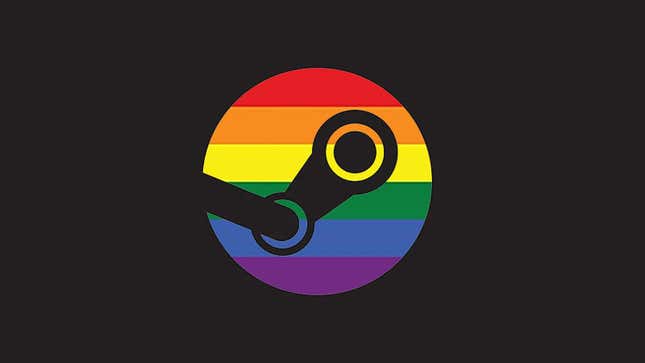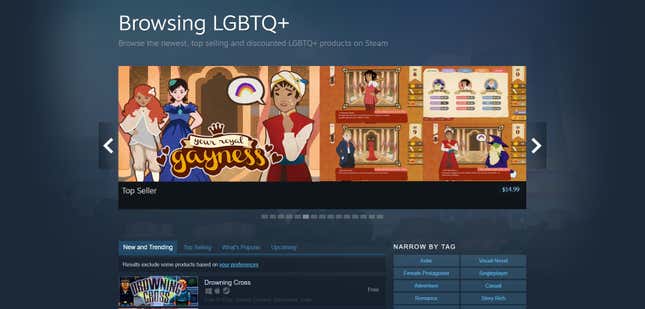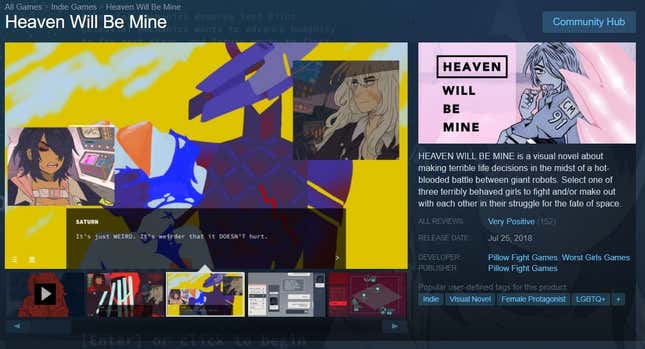
The process of finding games on Steam has become increasingly driven by a tag system. Mouse over, say, Sekiro on Steam’s front page, and you’ll see descriptor tags like “Souls-like,” “Difficult,” and “Action.” Click on one of those tags, and you’ll be taken to a hub page for that game category. But that’s just the beginning. Steam’s algorithmic recommendations are often tag-based, meaning that users’ ability to discover new games is, in part, tied to those tags. For these reasons, some Steam users and game developers have taken issue with the fact that, for years, Steam hasn’t had an official LGBTQ+ tag. Yesterday, that finally changed, with Valve adding an approved LGBTQ+ tag after a developer once again shined a light on the issue.
While users and developers have always been able to add their own tags to games since 2014, the tags in rotation have changed significantly in recent times. According to official documentation shared with Kotaku by an anonymous developer, Steam now runs on a “global set of hundreds of approved tags.” A game’s top 15 tags determine which tag pages games will appear on. The documentation says tags also inform algorithmic recommendations across Steam, which tend to focus on grouping up games according to overlapping tags. For example, when I log into Steam, I immediately see the platform’s top carousel of recommendations, which currently suggests I purchase Day Z because I’ve played games tagged with “Action,” “Open-World,” and “Survival.”
Smaller games live and die based on that kind of discoverability. These days, developers’ tags carry more weight than those of users, and developers now have the ability to remove tags—something that had not always been the case. Users can still tag games with non-approved tags, but that information is not visible to other users, and Steam doesn’t use those tags as part of its algorithmic sorting. So, basically, those custom tags are kinda useless.

On top of that, last year, Valve apparently removed hub page functionality from non-approved tags, seemingly as part of a broader effort to standardize the tagging system. This left devs who had previously custom-tagged their games “LGBT” out in the cold.
“With Steam straight up deleting our lgbt tag, this is a great reminder to put your past and future games on [competing platform] Itch instead if you already haven’t,” said one developer on Twitter at the time, including a link to the official LGBT tag that is on the Itch.io platform.
Valve made no response to the issue at that time, but now, a year later, there’s an official LGBTQ+ tag on Steam. It got added yesterday after an independent developer named Yitz—creator of hand-drawn RPG Nepenthe and upcoming “visual poem” To The Dark Tower—raised the issue on the Steam developer forums. He’d recently realized an LGBTQ+ tag would make perfect sense for To The Dark Tower, only to discover that there wasn’t one.
“We were trying to interpret a few strange lines in the poem my game is based on (‘Childe Roland To The Dark Tower Came,’ by Robert Browning), when we figured out that by interpreting the entire poem as a medieval-era gay man debating if his love is worth potential sacrifice, a number of ‘contradictions’ that experts found could be resolved easily,” Yitz said in a Twitter DM to Kotaku. “This would have been just a curiosity, had we not dug deeper, and found that the author, Robert Browning, was almost certainly a closeted bisexual, and at the time he wrote it was dealing with almost the exact same problems his fictional narrator internally faces.”
Upon realizing this, Yitz contacted Valve directly about the lack of an LGBTQ+ tag, but to no avail. “We’re open to approving new tags on a case-by-case basis that make sense as attributes that can be applied to at least a few games,” Valve said to Yitz in an email, which Yitz showed Kotaku. “If you have something in mind that isn’t already a public tag, please let us know in the Steamworks Discussions.”
So Yitz went there and started a thread explaining his situation. “I thought it would be appropriate to add a ‘LGBTQ’ tag, or at least a ‘Diversity’ tag,” he wrote in the private developer forum thread, which has been viewed by Kotaku. “To my great surprise, such tags are not given as possible options. Neither is anything similar. The closest you get to a ‘Diversity’ tag is ‘Female Protagonist,’ which while nice, is a very limited subset of what both developers and players are looking for when talking about diversity in games.”
This generated discussion, not all of it positive. “If you enjoy a game purely for the fact that the protagonist is lgbt than [sic] you don’t really enjoy that game,” replied one developer.
Yitz also asked for advice from queer game dev friends, just to make sure an LGBTQ+ tag wouldn’t cause more headaches than it’d solve. In an ensuing Discord discussion, other developers brought up valid concerns: for one, trolls will almost certainly misuse it, they said. If you look at Steam’s “Political” and “Politics” tags, for example, they’re often applied to games that simply involve some element of representation—no matter how small. One developer asked if an LGBTQ+ tag would attract similar trolls.
“It doesn’t matter if it does,” replied NoHuA, a developer currently working on a farming adventure RPG called Freyr. “You will have those forever.”
“I was thinking about the opposite happening: someone buying my game and getting upset that there is gay stuff,” said another developer, Erik Sheader, creator of The Endless Empty, a “surreal post-life adventure” with earnings donated to The Trevor Project, an organization providing suicide prevention services to LGBTQ+ youth.
Others raised further issues: People might, for example, try to use it as a marketing trick and apply the tag even when their games don’t contain any LGBTQ+ subject matter. But those are weaknesses of Valve’s current system, and they don’t change the fact that a tag makes it far easier for people to find and purchase games about these topics.
“People are gonna be shitty no matter what,” said NoHuA in the Discord chat. “The tag is important.”
Despite Valve’s silence on the subject over the past year, a Valve employee responded to Yitz’s Steamworks thread quickly and said that Valve had added “LGBTQ+” as a globally-approved tag, with a fresh hub page as evidence. It’s currently pretty underpopulated due to the relative lack of people who know it exists, but it’s there. Kotaku reached out to Valve for more information about why it only chose to add the tag now, and not at some other previous point, but did not hear back as of this publishing.

Yitz thinks this change stands to have big ripple effects, and he’s happy he was able to contribute.
“Tags like this are important because of what Steam tags are currently being used for—classifying games by various factors that will impact the player’s experience, and recommending games with similar tags to players who seem to like a lot of the given tag,” he said. “As such, tags are sort of equivalent to visibility, in a way. If I enjoy a lot of games tagged ‘Psychological Horror,’ for example, Steam will show me more psychological horror games. If I want to play more games that challenge traditional gender roles, until today Steam had no way of knowing that.”
Yitz was pleasantly surprised by how quickly Valve took action, and he hopes this trend—a new one for Valve, to say the least—continues in the future.
“The needs of players and developers are determined by us players and developers, and we should try to be more proactive in asking for change,” he said. “I’m glad that Steam responded so quickly to this request, and hope they continue to be more open about changes in the future.”